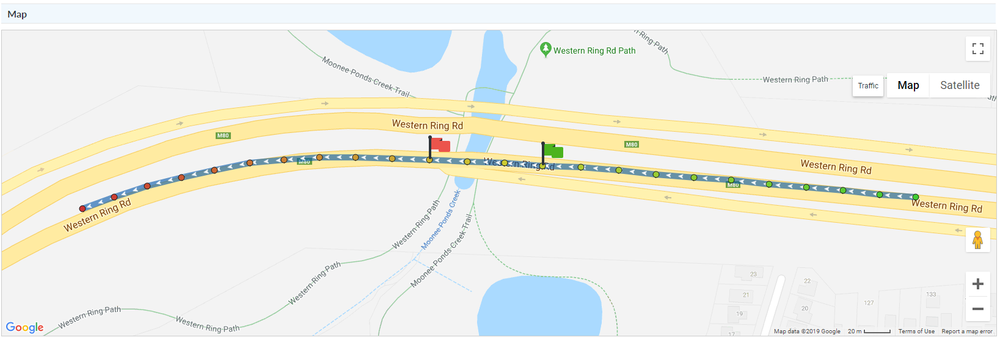When viewing detailed results of the Speed Event Management Report
Step-by-Step guide
STEP 1:
When you have opened up the detailed view of a Speed Event from the report results (or have been linked to one via an alert), the first information you will see will be the following;
After running a Speed Event Management Report, each event will contain the following information:
Device: Shows the device which that generated the speed event. This will be either an IVU, Qube or an iFace screen. If your vehicle is fitted with an IVU, the speed event will most likely be generated from that unit.
Vehicle: Indicates the vehicle that the aforementioned device is assigned to in NextGen.
Fleet: Fleet that the vehicle is a member of.
UserDriver: If you have driver login enabled and your driver was logged in at the time of the incident, then their name will be displayed in this column.
Branch: Branch that the driver is a member of.
Start Location: Location of the Speed Event
...
End: Time at which the speed event finished
Details:
- Duration of the speed event
- Maximum speed reached
- Speed limit
- Offset (speed over the limit at which the speed event is triggered)
- Threshold type
- Threshold duration
- End type
STEP 2:
The map indicates where the speed event took place. Green indicates the beginning of the speed event and red the end.
STEP 3:Threshold Type: This refers to which type of speed event has been triggered:
- SignPosted - based off road-specific maps data. Please note that this option is only applicable to iFaces, not standalone IVUs or Qubes.
- Config - a set speed dictated by our default settings our chosen by the Transport Operator upon request. You have the option of choosing a Config threshold for all of your vehicles in NextGen, specific fleets or even individual vehicles. Please contact Support if you would like to configure this setting.
Speed Events can be generated using either of these threshold types, or both (if both are selected, the lowest speed will always be used. For example, if the Config threshold is set at 100 km/h, but your vehicle drives at 95 km/h in a 90 zone, a SignPosted event will be generated).
Speed Limit (km/h): The limit that was breached
Max Speed (km/h): The highest actual speed that was recorded for this particular event
Duration (h:m:s): The length of the event
End Type: The reason why the event ended.
- Normal - The vehicle went back below the threshold
InvalidSpd - We had invalid GPS
ThrshChange - if the speed threshold changed (for example, Threshold type was SignPosted and the vehicle moved from an 80 km/h zone to a 90km/h zone)
View Event: Click on the eyeto view more details related to a particular Speed Event
After clicking on the View Event Eye, you will see the location of the event on a map.
Green = Start of the trip | Orange = Middle of the trip | Red = End of the trip
| Expand | ||
|---|---|---|
| ||
Below the map, you will see a speed vs altitude chart. This is particularly useful in understanding the driver's behaviour. Most of the time you will see the altitude decrease as the speed increases, indicating that the vehicle was speeding up as it came off a hill |
...
...
. If your vehicle is fitted with an IVU, the speed event will most likely be generated from this unit and not the iFace. |
| Expand | ||
|---|---|---|
| ||
Below the map, you will see a speed chart. This is particularly useful in understanding the driver's behaviour. |
NextGen also displays second-by-second speed information underneath the speed vs altitude chartfurther down the page. This gives you a clear view of the rate at which the speed increased, as well as valuable information regarding the quality of GPS signal during the speed event. If the GPS signal is less than ideal during the event, this brings the validity of the event into question.
The above second by second data indicates a perfectly A valid speed event - the NSAT (Number of Satellites is typically indicated by a high number of satellites (7+) is highin the NSAT column, and the HDOP is consistently a low number (<1.5) in the HDOP column.
Related articles
| Filter by label (Content by label) | ||||||||||||||||||
|---|---|---|---|---|---|---|---|---|---|---|---|---|---|---|---|---|---|---|
|
...








